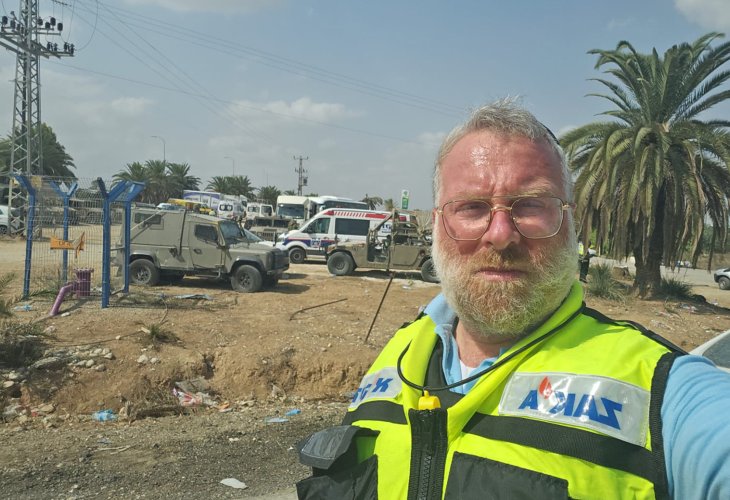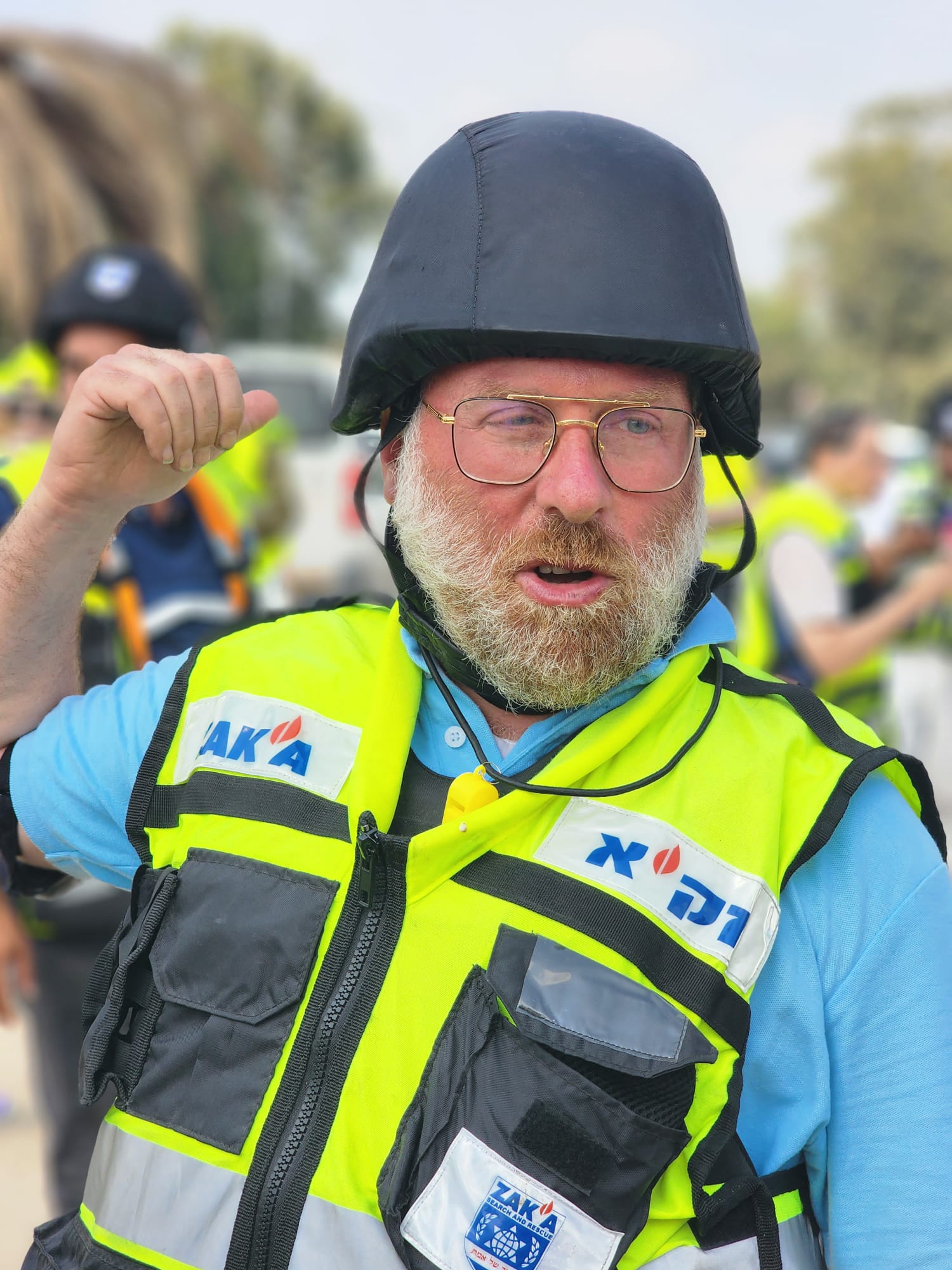"The Heart Breaks: We See the Victims as They Were in Their Last Moments"
Children found in the arms of their parents, elderly murdered with their caregivers, and the work carried out under fire with self-sacrifice. Ephraim Greidinger, a ZAKA volunteer, describes their work in the South in recent days. "We won't leave until the last deceased has been attended to and given the respect they deserve."
 Volunteer Ephraim Greidinger
Volunteer Ephraim GreidingerWhile the war continues and crowds flee the burning south, there are those who enter the line of fire. These are the ZAKA volunteers who operate in the communities surrounding Gaza, aiming to evacuate the many bodies of the casualties, transfer them for identification, and enable their burial as soon as possible.
"The work is hard and shocking," says Ephraim Greidinger, who works as a lawyer in his civilian life, and in his second role is a ZAKA management member and now volunteers along with about 200 other volunteers in the surrounding area. "For 30 years I have volunteered with ZAKA and we have never been exposed to such sights. The horrifying aspect here is realizing the method the terrorists used. They brought massive weapons alongside incessant rocket fire, booby-trapped the houses, and simply went house to house and murdered in cold blood. These things are unimaginable and incomprehensible."
Operating Under Fire
"Since the war began, we have been working nonstop," Greidinger says, "We have handled hundreds of cases already, and unfortunately, it seems we will soon surpass a thousand. Our activities are carried out against the clock, under great pressure and without pause, with one goal - to ensure every family receives information about their relative and is able to bring them to burial in the most respectful way. For instance, yesterday we worked until the early hours of the morning in Moshav Bari, where we encountered the hardest scenes - a bloodbath and evidence of a massacre on a scale we never imagined could be, and today we got up early to start dealing with the deceased in Kibbutz Nahal Oz, where unfortunately, there is no small number of murdered."
You work under fire. Isn't this too great a personal risk?
"We work hand in hand with the army and are constantly covered by elite unit soldiers. They also receive instructions from us on how to operate on the ground and assist us; it is truly a team effort. Clearly, the place is not safe at all, firing exchanges are constantly happening near us, we hear the incessant gunfire, and occasionally a terrorist who managed to hide jumps out at us during the treatment of the murdered. It's impossible to say there is no fear, but we try as much as possible to protect ourselves and IDF soldiers do everything to protect our lives. So far, by the grace of Heaven, none of our team has been injured." Greidinger adds, "We often encounter dead terrorists. We deal with them less, but according to army instructions, we mark them as needed and evacuate the bodies."

How do you differentiate between the bodies of terrorists and Israeli citizens?
"The army tells us who is Israeli and who is a terrorist, but there have been several cases where further examination revealed it to be an Israeli and not a terrorist, of course, we rushed to provide the necessary treatment and undertake the important task of bringing them to a Jewish grave. Various companies have provided us with refrigeration trucks, enabling us to transport the bodies for further handling, so they can finally be identified and buried."
Continuing Without Stopping
Greidinger wishes to share another point: "When I returned home last night after being away for two days, I learned for the first time there are complaints about the operation being too slow and that many families are waiting for information about their loved ones who have not yet been identified. My heart breaks for the families; there's nothing greater than the uncertainty, but it must be understood we are more than 200 people operating in shifts without a moment's rest, as the work gets harder day by day, due to both the weather and the condition of the deceased on the field. For example, on the first day, we mainly handled bodies scattered on the roads and had to evacuate them so vehicles could move along the route, but in the last two days, the roads have been cleared, however, now, we operate within the communities themselves - going house to house and seeing the people murdered just as they were in their last moments of life. Seeing children's rooms, with drawings on the walls, the elderly with their caregivers, and family members hugging each other, realizing this is how they experienced the brutal attack that claimed their lives. Not to mention the homes destroyed and burned to the ground. These are the moments when you can no longer cope. The cruelty is unimaginable."
There are also miracles. "There was a case where we were handling a scene with many fatalities, and suddenly we discovered someone with a pulse, who was found to still be alive. Although in serious condition, there is a chance of saving him. These were small moments of hope and great joy amid this bloodbath."
This is true self-sacrifice! What gives you strength to continue doing this?
"One thing stands before us - the understanding that there are families waiting anxiously for our updates, and the great importance of caring for the dignity of the deceased, so every Jew reaches the correct grave, and that we do not, Heaven forbid, harm their dignity."
Do volunteers quit during work because they can't continue?
"There are those who find it difficult, and for this purpose, ZAKA has a 'resilience' unit that assists during times of mental difficulty, but I have not yet encountered a volunteer who left the activity because of this. Despite the hardship and impossible sights, when considering the immense strength and significance of the activity, it is understood that this is truly a sacred task, and thus, we continue working without stopping. We promise not to leave the place until the last deceased is brought to a respectful burial."

